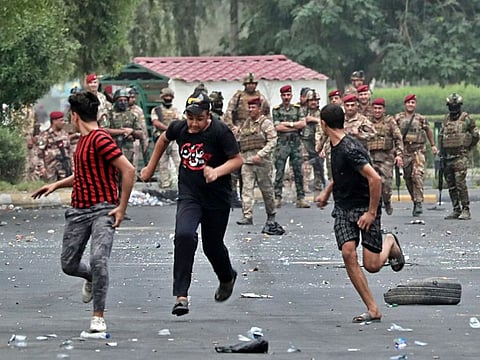Iraq protests are a cry for a better life
Young generation, fed up with corruption, demand reforms to turn around the country

In Iraq, we call them the Pubg and Snapchat generations. These are youngsters born shortly before or after the US invasion of Iraq in 2003. They are generally considered a hopeless generation since they spend most of their time on social media; the only thing they care about is their hairstyles or looks.
Saddam Hussein means little to them. This generation did not endure the brutalities of the Saddam regime. So at their age, what did I see? I put myself in their shoes and looked back at my life as a 20-year-old in Iraq.
I remember the sounds of bullets and explosions outside my window. I remember the cry of my mother and the sadness in my father’s face during the years before and after 2003. Militias battled in my neighbourhood and car bombs went off every day. I used to see dead bodies strewn in the streets on my way to school in the morning. I remember the fear. I thought Iraq was the worst country in the world.
When I thought the horrors were over, Daesh [the self-proclaimed Islamic State of Iraq and the Levant] reared its ugly head in 2014. The battle to recover the occupied cities from the terror group killed thousands of Iraqis, but after the defeat of Daesh, some kind of stability returned to the country.
People are angry now. They resent the government’s unwillingness or inability to reform the system. They are fed up with leaders’ speeches, promises and lies. Their dreams of a better life after the fall of Saddam’s regime lies tattered.Ali Al Shouk
For the young Iraqis, the internet offers a window to the world. They learned that life can be lived decently, without fear. They see modern cities with top-class infrastructure, electricity, water, good health services, proper education facilities and well-paid jobs. When they close the internet, they go back to a reality where they see only a corrupted government. They see a country where jobs are given on the basis of sectarian or ethnic quotas, but not on merit.
Angry Iraqis say this has allowed Shiite, Kurdish, Sunni and other leaders to loot the country of its wealth by misusing public funds to enrich themselves and their followers. Ordinary citizens are left to fend for themselves.
Iraqis have stopped trusting all political parties. Most people boycotted the recent election to show their displeasure at the state of affairs in the country.
Adel Abdul Mahdi’s government came to power last year with promises to eliminate corruption and close the gap between the wealthy and ordinary citizens. Almost one year has elapsed, Abdul Mahdi has failed to deliver on the promises. The prime minister is repeating his predecessor’s mistakes.
People are angry now. They resent the government’s unwillingness or inability to reform the system. They are fed up with leaders’ speeches, promises and lies. Their dreams of a better life after the fall of Saddam’s regime lies tattered.
The anger found its way into social media, where posts calling for protests began to appear. The messages called for a correction in the political path of Iraq. People demanded a better life.
When protests erupted in September, it took a deadly turn. Violence was unleashed by security forces on the unsuspecting people who were protesting peacefully. They were armed with flags to show their pride, and sodas to wash their faces from tear gas fired by anti-riot forces. Internet was shut down, so the truth about casualties remained fuzzy. Blood flowed on the streets, and the body count rose. Shocking videos of cold-blooded killings began to emerge on social media platforms.
Some videos showed youngsters laughing at the sound of bullets. In one video, a young protester yelled: “I just want to have a country, want to have a job, decent life and...” A bullet didn’t allow him to finish the sentence.
He was young and peaceful. He hoped to live in a decent country. Just like the one he used to see on the internet.
More than 100 people were killed and 6,100 injured, according to government figures. But the youngsters were undeterred. They went to Tahrir square in Baghdad again on October 1, to protest. They wanted solutions for unemployment and poverty. They wanted the government to resign. They wanted changes to the election law and have a new election. An election where the politicians who ran the country from 2003 are not allowed to run.
There were more protests, all over Iraq. They were peaceful. Some political figures consider these protests to be existential threats. They are not. They are merely a peaceful expression of resentment at the government that has stolen the people’s dreams. Dreams of a good life, in a country which safeguards citizens’ basic needs.
After seeing a week of protests, I owe an apology to this generation of youngsters. I’m not ashamed to admit I was wrong. This is not a useless generation. They are fearless. This is the generation that will herald a new future for Iraq. I’m sure.



